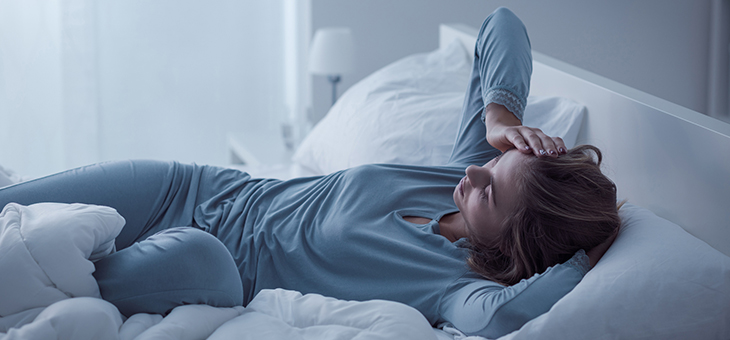It’s not uncommon to sweat during the night. You may sweat a little or a lot, depending on what coverings you sleep with, how warm your room is, and even what you ate before going to bed.
But if you sweat enough that you regularly wake up with wet pyjamas and bedding, there could be an underlying issue.
Dr Clare Morrison says: “Night sweats are a relatively common symptom, with many possible causes. Fortunately for most, night sweats usually have an innocent explanation, but there are exceptions.
“Virtually anything that causes excessive daytime sweating will cause night sweats. The most common include fever, usually caused by infections. These can range from common illnesses such as flu; or rarer ones, including TB, osteomyelitis (infection of the bone), endocarditis (infection of a heart valve) and HIV.”
Medications
Some medications can cause night sweats. If you’ve recently started a new medication and are experiencing night sweats that disrupt your sleep, talk to your healthcare provider on how best to manage the side-effects.
Some common drugs known to sometimes cause night sweats include:
- steroids, including prednisone and cortisone
- both tricyclic and selective serotonin reuptake inhibitor (SSRI) antidepressants
- pain relief medications, such as aspirin and acetaminophen
- medications for diabetes that help lower blood sugar
- hormone therapy medications
- phenothiazine antipsychotics.
Other causes
The most well-recognised cause of sweating, including night sweats, is menopause. Night sweats are often caused by the hormonal changes sparked by menopause and perimenopause in women over 40. Up to 85 per cent of women experience hot flushes during menopause, and in 55 per cent of women they begin before any menstrual irregularities
“Other common causes of night sweats include obesity, pregnancy, excess alcohol intake, caffeine and spicy food. Another possible cause is ‘hypoglycaemia’ (low blood sugar), for example from diabetes medication, including tablets and insulin.
“Sometimes, night sweats can be a sign of an over-active thyroid gland, particularly if associated with weight loss, loose stools and palpitations. Other times no obvious cause is detected, despite severe persistent night sweats. This is known as idiopathic hyperhidrosis,” says Dr Morrison.
“It’s always worth seeing your GP if you experience night sweats, because occasionally they can indicate serious illness. Foremost of these is cancer, particularly lymphoma, leukaemia, and rarer ones such as carcinoid and adrenal tumours.
“Other rare, but potentially serious conditions, include autonomic dysreflexia and post-traumatic syringomyelia (spinal cord injury complications), stroke, pheochromocytoma (adrenal gland tumour) and autonomic neuropathy (damage to nerves that help organs function).
“When you see your GP, they will want to know how long you’ve had the night sweats, and whether there have been any other symptoms. The most relevant ones are weight loss, fever, malaise, fatigue, loss of appetite, unusual lumps, or persistent pain. It may be necessary for you to have a blood test to get an overall idea about your state of health, including a full blood count, thyroid function or inflammatory levels.
“Treatment will depend on the cause. If the underlying problem is innocent, then simply wearing light, loose clothing in bed with layers of cotton sheets, rather than a thick duvet, may help. Ensure the room is kept cool and have a glass of water by the bed, to replace lost fluids. Ensure the mattress is aired thoroughly before making the bed, as moisture encourages germs to proliferate.
“If in doubt, do get your GP’s opinion,” says Dr Morrison.
If you don’t have any other symptoms, here are some things to try that may stop night sweats.
- Sleep in a cooler room. Leave a window crack or set up a fan or air conditioning.
- Avoid physical activity right before going to bed.
- Try breathable, lighter bedding. It can help to invest in moisture-wicking sheets.
- Pop an ice pack under your pillow.
- Drink cool water through the night. It can help cool you off and help you stay hydrated when sweating.
- Try a cool shower before going to bed.
- Avoid eating spicy foods, smoking cigarettes, or drinking alcohol right before going to bed.
Do you ever have night sweats? Have you spoken to your GP about them? Have you received a formal diagnosis?
– With PA
If you enjoy our content, don’t keep it to yourself. Share our free eNews with your friends and encourage them to sign up.
Related articles:
https://www.yourlifechoices.com.au/health/covid19/sleeps-vital-role-in-mental-resilience
https://www.yourlifechoices.com.au/health/your-health/how-menopause-affects-skin
https://www.yourlifechoices.com.au/health/your-health/hardest-diseases-to-diagnose
Disclaimer: This article contains general information about health issues and is not advice. For health advice, consult your medical practitioner.

